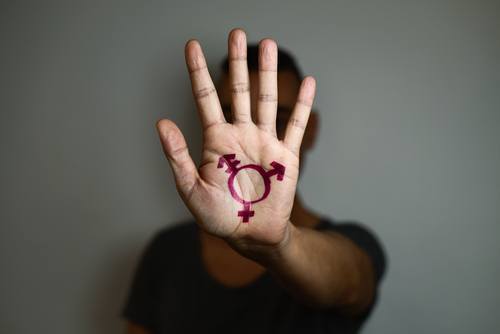California law expressly prohibits employers from discriminating against a worker based on gender identity or gender expression. Transgender employees who experience illegal discrimination can bring a lawsuit against the employer for damages.
Below, our California labor and employment lawyers discuss the following frequently asked questions:
- 1. What is transgender-based employment discrimination?
- 2. Which laws prohibit transgender discrimination in the workplace?
- 3. Can employers ask about my gender?
- 4. Can I sue my employer?
- 5. What damages can I get?
- 6. Can my boss fire me for reporting transgender discrimination?
- 7. What about transgender discrimination outside of the workplace?
- Additional reading

The California Fair Employment and Housing Act (FEHA) protects applicants and employees from discrimination based on gender, gender identity, and gender expression.
1. What is transgender-based employment discrimination?
It is employment discrimination in California when your gender identity (actual or perceived) is a “substantial motivating factor” in a company taking an “adverse employment action” against you. Common “adverse employment actions” include:
- Passing you over for a job
- Firing you
- Refusing to select you for a training program
- Demoting you
- Segregating or isolating you1
There are limited exceptions where an employer may treat a group of employees differently, known as “bona fide occupational qualifications” (BFOQs). For example, personal privacy considerations may justify a BFOQ where the job requires an employee to conduct body searches or observe people in a state of undress.2

2. Which laws prohibit transgender discrimination in the workplace?
With regard to federal law, the Equal Employment Opportunity Commission (EEOC) interprets and enforces Title VII’s prohibition on sex discrimination as forbidding any employment discrimination based on gender identity or sexual orientation. However, federal law applies only to companies with 15 or more employees.
With regard to state law, the California Fair Employment and Housing Act (FEHA) protects applicants and employees from discrimination based on gender, gender identity, and gender expression.16 Gender and transgender discrimination are prohibited in any aspect of employment or hiring. FEHA applies to companies with five or more employees, so it covers more businesses than Title VII does.
Both state and federal law gives you equal access to the appropriate restroom that corresponds to your gender identity. Similarly, you have the right to use the employer’s gendered dress codes / dress standards that correspond to your gender identity.
Note that it does not matter if you are in fact cisgender but the employer wrongly believes you are trans: You are protected from discrimination based on actual or perceived gender identity. Also, employers cannot discriminate against you for having trans friends or family members.3
3. Can employers ask me about my gender?
It is not acceptable for California employers to ask about your gender identity, gender expression, or whether you had medical or surgical procedures related to gender. Employers also cannot indirectly probe your gender identity such as by asking about your body or spouse.
Employers can ask about gender or biological sex only if it is a bona fide occupational qualification. Otherwise, employment cannot be conditioned on gender identity, and you cannot be required to reveal gender on job applications.
It is not necessarily a sign of gender discrimination if an employer asks you questions like
- whether you are male or female, or
- your height and weight.
However, these questions need to be applied equally to all job applicants and the information is to be used
- for legitimate record-keeping or screening purposes and
- not to discriminate.4

California generally offers broader protections against gender discrimination than federal law does.
4. Can I sue my employer?
If you have been discriminated against by your California employer because of your gender identity or expression, you can sue the employer. First though, you generally have to file a complaint with California’s Civil Rights Department (CRD).
If you wish, you can hold off on suing and allow the CRD to investigate your claim and mediate a resolution. However, we recommend requesting an immediate “right to sue” notice from the CRD so we can bring a lawsuit right away. In our experience, threatening litigation yields a much better settlement than what you can get through the CRD.5
For a CRD claim or a lawsuit to be successful, we need evidence of discrimination. So be sure to document everything, including the names of witnesses who can back up your story.
5. What damages can I get?
Potential money damages in a transgender-based discrimination lawsuit typically include:
- Back pay with interest and front pay
- Higher income from a promotion
- Benefits and pension payments
- Bonus payments
- Pain and suffering and emotional distress
- Punitive damages
- Attorney’s fees and court costs6
If you were terminated based on your gender identity or expression, the court can order that the employer rehire you. However, you may wish to find a new workplace rather than return to one with painful memories.
6. Can my boss fire me for reporting transgender discrimination?
No. A California employer cannot take retaliatory action, including termination, against you for citing discrimination or harassment violations or filing a gender discrimination lawsuit.7 Firing you for filing a harassment or discrimination claim is grounds for bringing a wrongful termination lawsuit against the employer.
7. What about transgender discrimination outside of the workplace?
In California, transgender people may not be discriminated against with regard to:
- housing,
- education,
- public accommodations,
- insurance, or
- medical care
because of their gender identity.8
Additional reading
For more in-depth information, refer to these scholarly articles:
- Transgender Equity in the Workplace: A Systematic Review – SAGE Open.
- Voices from beyond: A thematic content analysis of transgender employees’ workplace experiences – Psychology of Sexual Orientation and Gender Diversity.
- Gender inequality: Nonbinary transgender people in the workplace – Cogent Social Sciences.
- Gender Identity Issues and Workplace Discrimination: The Transgender Experience – Journal of Workplace Rights.
- Queering the Gender Binary: Understanding Transgender Workplace Experiences – Sexual Orientation and Transgender Issues in Organizations.
Legal References:
- Fair Employment and Housing Act 12940. Also see Civil Rights Act of 2005. Prior to the Gender Nondiscrimination Act, California law forbade discrimination against gender-non-conforming and trans people as early as 2004 re. jobs and housing and 2005 re. public accommodations, which was especially important for people of color and low-income communities. Landlords cannot refuse to rent, increase the rent, or evict tenants based on their actual or perceived gender identity. Transgender people have same rights as cisgender people re. insurance, education, and using bathrooms in public places such as restaurants, etc. Plus doctors cannot deny treatment to transgender people. Since the Gender Nondiscrimination Act has no religious exception, religious-based organizations such as hospitals or homeless shelters cannot deny people services just because they are transgender. Also homeless shelters cannot force people to wear uniforms or use a bathroom at odds with their gender identity. However, some non-discrimination laws do not apply to certain religious schools and organizations. See also Taking Offense v. State of California (Court of Appeal, Third Appellate District, 2021) 66 Cal. App. 5th 696. Fair Employment and Housing Act 12926. Fair Employment and Housing Act 11030. The transgender employment discrimination laws also apply to unions and labor organizations, which are prohibited from excluding, expelling, or restricting membership to a person based on sex, gender, gender identity, or gender expression. Transgender discrimination prohibitions also apply to apprenticeship training programs and employment agencies. Fair Employment and Housing Act 11031.
- California Code of Regulations 7286.7. (“An employer has to prove that such a practice is justified because “all or substantially all of the excluded individuals are unable to safely and effectively perform the job in question and because the essence of the business operation would otherwise be undermined.”). Fair Employment and Housing Act 11031.
- U.S. Equal Employment Opportunity Commission, “What You Should Know About EEOC and the Enforcement Protections for LGBT Workers” at: https://www.eeoc.gov/eeoc/newsroom/wysk/enforcement_protections_lgbt_workers.cfm. Macy v. Dep’t of Justice, EEOC Appeal No. 0120120821, 2012 WL 1435995 (April 20, 2012), (“Thus, we conclude that intentional discrimination against a transgender individual because that person is transgender is, by definition, discrimination “based on . . . sex,” and such discrimination therefore violates Title VII.”)
- Fair Employment and Housing Act 12940, see footnote 1 above. Bostock v. Clayton Cty. (2020) 140 S. Ct. 1731; Supreme Court says federal law protects LGBTQ workers from discrimination, CNN (June 15, 2020). Labor Code 1197.5 LC(a)(1)(D).
- Fair Employment and Housing Act 12965; California Assembly Bill 9 (2019). Alternatively, you can file a complaint with the Equal Employment Opportunity Commission (EEOC), which enforces federal sex discrimination laws.
- Fair Employment and Housing Act 12965.
- Government Code 12940 GC. California Code of Regulations (CCR) tit. 2, § 11021.
- Gender Nondiscrimination Act, AB 887 (2011).
